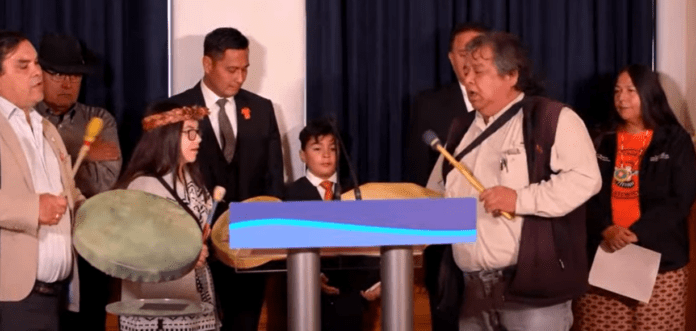In a bid to reduce the disproportionate number of Indigenous children in provincial care, the government says it will amend legislation to give Indigenous Peoples more control over child and family services.
Specifically, four Indigenous governing bodies in B.C. will exercise their jurisdiction in such matters: Cowichan Tribes, Gwa’sala-‘Nakwaxda’xw Nations, Splatsin First Nation, and Sts’ailes First Nation.
“Indigenous Peoples have long told government that the current child welfare system is a continuation of harmful colonial practices,” Children and Family Development Minister Mitzi Dean said at a news conference today in Victoria.
Dean said calls to action from the Truth and Reconciliation Commission begin with demands for changes to child welfare to address the legacies of historic policies.
To First Nations in the room she said: “Ongoing findings of unmarked burial sites on the grounds of former so-called residential schools have shown Canadians what you and your communities have always known: the violence and harm that the colonial system inflicted upon Indigenous Peoples. This pain and trauma continues to this day through the child welfare system.”
The province says Indigenous children represent 68 per cent of all children in provincial care, although they only comprise 10 per cent of the general population.
“These changes represent a significant step toward reconciliation by recognizing for the past 150 years the laws and policies regarding Indigenous children and child welfare have had a severe impact on Indigenous families,” said councillor Stephanie Atleo of the Cowichan Tribes.
She added the recognition of their “inherent rights to protect, care for, and nurture children” provides a “new and positive path forward.”
However, councillor Theresa William of the Splatsin was more circumspect. She noted the Splatsin, who are the southernmost tribe of the Secwépemc Nation, have exercised jurisdiction over child and family services under their own bylaw since 1980.
However, she said past provincial child welfare legislation has at times undermined their decision-making authority, resulting in “costly and time-consuming” jurisdictional disputes.
She also said they have concerns about the way the province developed the amendments and with the amendments themselves.
“The province’s process was very rushed and gave leadership very little time to consider the proposed changes and what it might mean for us,” she said. “The province must do better in its process of collaborating.”
She said she was hopeful the ministry is “charting a new path” but “we will have to wait and see if these amendments truly begin a relationship between the province and Splatsin where barriers are removed.”






